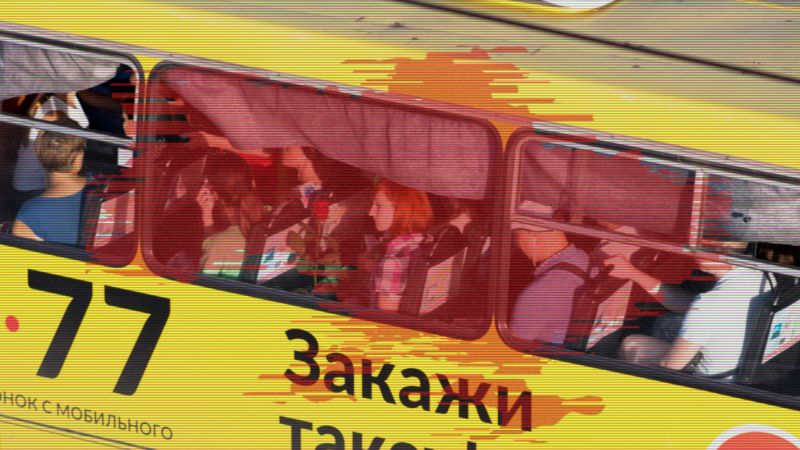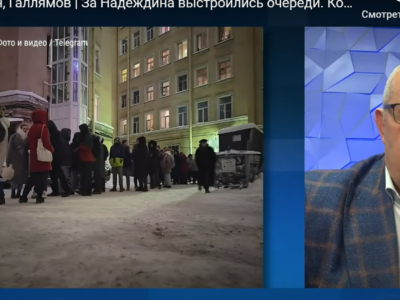
Photo illustration by Giovana Fleck and Ivan Sigal. Photo: Public bus, Mariupol, Ukraine, July 2016, by Ivan Sigal.
Russia’s second invasion of Ukraine started on February 24, 2022 and has resulted in major loss of life, damage to vital infrastructure, and the displacement of over 8 million refugees as well as millions of internally displaced Ukrainians. The West has leveled unprecedented sanctions against Moscow in response, significantly weakening the Russian economy. At the same time, the Russian government has cracked down on critics, shut down independent media, and imposed draconian penalties on individuals who oppose the war.
In less than half a year of war, Kyiv has successfully defended major urban centers, with increased military support from the West, and despite a major asymmetry in forces and equipment compared to Russia. Moscow, on the other hand, despite claims of harboring one of the most powerful armies on earth, has been bogged down by a lack of preparation, ineffective internal communication, low morale, and failing resupply routes. It has nevertheless managed to control large parts of the east of Ukraine in the Donbass region, and, at times, the Kherson region.
The front line shifts on a daily basis, and both sides take and lose territory regularly. The human cost remains extremely high, with dozens Ukrainian and Russian soldiers, as well as Ukrainian civilians, dying on an almost daily basis.
The daily threats to Ukrainian security have also affected its society and institutions. Key national debates are now centered on the need to accelerate reforms, the role of women, media plurality, the approach to Russian culture, a new identity defined by the war effort, and the even more crucial role of digitization.
Belarus, which borders both Russia and Ukraine, has also been dragged into the conflict, as it serves as a base for Russian troops and equipment, while some Belarusians have joined the Ukrainian defense forces to fight Moscow and the pro-Russian regime of Lukashenko in Minsk.
Diplomatically, Russia has become increasingly more isolated. China and India, initially strategically ambiguous about the invasion, have started to distance themselves from Moscow’s action. A large majority of UN members have condemned Russia’s actions, while NATO and the European Union are providing Ukraine with political support, military equipment, and humanitarian aid. Nascent discussions regarding Ukraine’s reconstruction have emerged, but the key questions of who will pay the estimated USD 750 billion needed, how aid will be distributed, and who will rebuild Ukrainian cities and infrastructure remain unanswered.
At the same time, the war is also turning into an economic one: Europe is caught in a gas conundrum as many countries depend on supplies from Russia, while there are few reserves to meet the looming 2022–2023 winter season.
Similarly, a number of countries largely dependent on grain imports and fertilizers from both Russia and Ukraine are caught in the trade war, given that the passage for ships transporting goods is blocked by Moscow’s attacks or affected by sanctions.
Global Voices is covering the war with a special focus on consequences, both political and economic, in Africa, Asia, the Middle East, Latin America, and Central and Eastern Europe, while animating the lived experience of people in Ukraine, Russia, and Belarus.
Reliable sources with frequent updates in English, Ukrainian and Russian:
- The Kyiv-based English-language newspaper Kyiv Independent.
- The Riga-based independent Russophone and Anglophone media outlet Meduza.
- The Vilnius-based independent media outlet Media Zona
- The Insider
- Bellingcat
- Zaborona
- Holod Media
- Ukrainian: The Kyiv-based Ukrainska Pravda
- Ukrainian: The Kyiv-based Espresso.TV
- Ukrainian: The Lviv-based Zahid
Stories about Russia invades Ukraine
A temporary welcome: Russians in Turkey since February 2022
Since early 2023, Turkey is increasingly a stopover before further migration or sometimes a return home, with many Russian exiles being refused residence permits
Reporting from a psychiatric ward housing Russian soldiers who fought Ukrainians
Soldiers live for months in the psychiatric ward. None of the patients the journalist spoke to wanted to return to the war, saying they'd rather go to prison or die.
Song titled ‘Give birth to 1000 children for me’ was banned in Russia
It includes the lyrics: Give birth to 1000 children for me. Give each of them a name — soldier. Our president will send them to die — to shoot in Donbas.
We can do more to help Ukraine
Two years and thousands of sanctions later, Moscow’s war capacity remains intact — Russia keeps bombing Ukraine as much, if not more,than in February 24, 2022 when the full scale invasion began.
Hundreds of thousands supported anti-war candidate in Russia but he was banned from elections
Boris Nadezhdin and Yekaterina Duntsova happened to be the main figures of the Russian elections in March 2024, although neither of them are going to be on the ballot
Fleeing home as a queer Ukrainian
After her own escape from Kherson just before Russian occupation, the LGBTQ+ activist coordinated with international volunteers and raised funds to help others evacuate from the city.
Russian artist Alexandra Skochilenko addresses the court in Saint Petersburg at her trial over anti-war messages
"My trial, widely followed in Russia and globally, will make history, regardless of the verdict. You're not judging a terrorist, extremist, or even a political activist. You're judging a pacifist."
While in exile in Lviv, Ukraine, a Crimean Tatar woman promotes her community through cuisine
"It is about the nostalgia of those people who lived in Crimea, visited Crimea, or only dreamed of visiting it."
Ukrainians in one of the most war-torn towns face grave realities but avoid despairing
In many respects, no matter when and how Russia's invasion of Ukraine ends, there will be no immediate happy ending for villages, towns, and cities like Izyum.
The story of a transgender person in an occupied city in Ukraine
Knowing the homophobic Russian state policy, members of the LGBTQ+ community tried to avoid the Russian occupiers, fearing they might face increased persecution because of their gender or sexuality.
Yevgeny Prigozhin died in a plane crash. Did Russians know who he was?
In a poll conducted in Russia three weeks after the mutiny of Yevgeny Prigozhin and his Wagner group, only a third of respondents (33%) said they knew about “the military crisis that occurred in Russia on June 24.”
Suspectibility to conspiracy theories makes Western Balkans easy target for Russian disinformation, geopolitical analyst says
Although at first glance publishing disinformation seems accidental and sporadic, the occurrence is not at all random, but part of military doctrines of autocratic regimes intent of spreading geopolitical influence.
The future of Ukrainian New York
A frontline town in eastern Ukraine restored its historic name and gained fame in 2021. Now, activists and supporters are trying to preserve what they can after losing their home and friends.
About 47,000 Russian soldiers died during the full-scale Russian invasion of Ukraine
In just 15 months of fighting in Ukraine, three times more Russian soldiers have died than Soviet troops did over 10 years in Afghanistan.
Death and defiance in a historic Ukrainian city after a Russian rocket strike
Ten people were killed and 42 wounded in Lviv, a city packed with tourists, civilian volunteers, and those fleeing the Russian occupation of the Ukrainian east and south.
Displaced Ukrainian women's football team carries on while dreaming of returning home
The path they've already made in their home city of Mariupol must be made again by building a new competitive team, step by step.
Disinformation helps weaponize homophobia in the Balkans
After 2013, Moscow has emerged as major generator of homophobic narratives that exploit existing endemic intolerance in the Balkans region.
Ukrainians flooded social media with memes as Wagner Group marched toward Moscow
"I must give credit to the General Staff," one user wrote in a viral Facebook post. "The counteroffensive started, indeed, in an unexpected place."
Ukrainian businesses from destroyed cities are fighting for survival — and winning
Some entrepreneurs have lost everything twice, in 2014 and in 2022, but managed to restore their businesses again.
Little Mariupol in exile in Dnipro, Ukraine
The hope of those from occupied Ukrainian lands lies in the people who are ready to rebuild everything — even if it means starting a humanitarian center in another city.
Residents of Ukrainian town occupied by Russia recount stories from a flooded Oleshky
People on the occupied by Russia left bank of the river Dnipro were abandoned by occupational authorities during the flood. These are their stories.






















